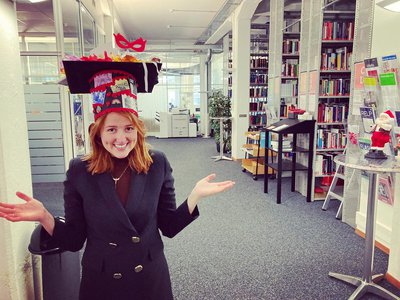10 Dec 2021
Aylin Yildiz successfully defends her PhD Thesis
On 6 December 2021, Aylin Yildiz, PhD student at the WTI, successfully defended her thesis, which she wrote under the supervision of Prof. Elisa Fornalé and Dr. Nilüfer Oral. Read our interview with Aylin below.
1. Congratulations Aylin, you just defended your thesis in front of your supervisors and others! How are you feeling?
Thank you very much! I am feeling very happy and proud about finalizing my PhD project. I am also feeling responsible now about putting my PhD project “in action” and addressing my research topic in practice.
2. Can you tell us what your thesis is about and why the topic matters?
My thesis is about human mobility in the context of disasters and climate change. Simply put, changes in the global climate amplify the risk of disasters, both in their intensity and in their frequency. As air and water temperatures increase, sea levels are rising, precipitation is heavier, droughts and wildfire seasons are longer, storms are supercharged and wind speeds are greater. In this context, people are on the move away from such negatively affected areas.
This topic matters because no one is immune from the impacts of disasters and climate change. It is important to see how the current international legal framework can be utilized to address this issue – for instance, how can States’ commitments for services mobility under the GATS agreement be used to facilitate safe, orderly and regular migration? Similarly, what role can preferential trade agreements play in opening up legal pathways for labour mobility?
This topic is closely linked with the enjoyment of our basic rights, such as the right to life and the right to food. International cooperation and concerted action are needed to address the impacts of climate change and disasters on human mobility.
3. How did you go about doing such extensive research?
I first determined my research questions, which were: (i) how can human mobility in the context of disasters and climate change (“HMDCC”) be conceptualised, (ii) how can HMDCC be addressed, and (iii) how can the way HMDCC is addressed be operationalised.
Then, I determined my methodology. I used the secondary research method, which was in the form of desk review, to analyse doctrinal discussions, policies, laws, rules and legal decisions. I also used the primary research method, which was in the form of fieldwork research. I went to Fiji for three months and undertook in-depth interviews with experts. I learned about the planned relocation policies of Vanuatu and Fiji during this time, which are important policy tools that help to resettle people out of “harm’s way”, i.e. the adverse impacts of disasters and climate change.
4. How has your experience been as a PhD student at the World Trade Institute (WTI)?
It has been great! I really benefited from the structure and content of the WTI’s doctoral school. For instance, the WTI covered my participation costs in the Hague Academy of International Law, where I, alongside my team members, received awards in the Hours of Crisis competition, due to our performance. The doctoral school also offers highly relevant and important courses, such as treaty interpretation and the responsibility of States. These courses were essential to advancing my understanding of international law. Also, the annual Ph.D. colloquium presentations prepared me for my official defence. I would recommend the WTI’s doctoral school to everyone!
5. What are the highlights from your time as a WTI PhD student?
Being a member of the WTI family, making so many life-long friends, and learning from amazing scholars and practitioners are definitely some of the highlights. Working with my supervisor SNSF Prof. Elisa Fornalé was a privilege.
Becoming a part of the Gender Committee of the WTI and organising the first gender lecture, which hosted Dr. Nilüfer Oral, was a great moment.
Receiving the scholarship to attend the International Law Association’s (ILA) 79th Biennial Conference was also an important moment for me. The scholarship was awarded based on a paper I wrote about my doctoral research. I had the opportunity to contribute to the work of the ILA’s Study Group on the Cross-Border Violations of the Rights of Children in Migration. I was also invited to make a speech at the Closing Plenary of the Conference.
6. What advice would you give people who want to embark on the PhD journey at the WTI?
Find the topic that feels right to you and then contact one of our professors at the WTI to ask for supervision. Make sure you are really passionate and motivated about the topic, but that you are agnostic about where the research will take you. Once you are admitted to the programme, inform yourself early on about the services the University of Bern provides (e.g. sports facilities, counselling services, free language courses) and use these services.
7. What is next for you?
I am looking for work opportunities. In the meantime, I have started project “Pop-up Law”, which aims to communicate international law in a fun, quick and reliable way using social media. Although the project is still at its infancy, the Youtube channel “Pop-up Law” and the Instagram account “@popuplaw” have already started sharing creative posts and videos.
If you want to read more about the WTI's Doctoral Programme, please click on the link below.
Further info
Yildiz Noorda, Aylin


